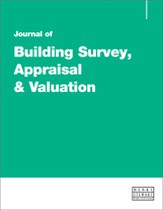The impact of Minimum Energy Efficiency Standards on dilapidations claims
Abstract
The Energy Efficiency (Private Rented Property) (England and Wales) Regulations 2015 (MEES Regulations) were said to be aimed at improving energy efficiency to help England and Wales meet their CO2 reduction targets. Not only do they have the potential to severely affect one’s ability to let premises based on Minimum Energy Efficiency Standards (MEES), but also provide new strategic options with regards to dilapidations and other areas of landlord and tenant dispute. As the MEES Regulations have applied to all new leases for a year, arguments concerning energy enhancements are now part of discussions between landlords and tenants regarding dilapidations at lease end, despite a lack of enforcement action to date. This paper summarises the relevant parts of the MEES Regulations, which rely on the pre-existing Energy Performance Certificate (EPC) regime to determine a property’s energy efficiency standard. The problems of using EPCs as a benchmark are highlighted, as are some potential tactical opportunities for those involved in landlord and tenant disputes. The paper discusses the current and potential impact of the MEES Regulations on the different elements of a commercial lease-end disrepair claim. It also addresses disputes under other tenant covenants concerning the condition of the demised premises, both mid-term and at lease end. Further, it suggests some methods that might be adopted to mitigate the impact of the MEES Regulations on both landlords and tenants.
The full article is available to subscribers to the journal.
Author's Biography
Simon Hartley is a partner in RadcliffesLeBrasseur’s Property Litigation department in London. He trained at Linklaters before becoming head of real estate litigation at Mayer Brown, prior to joining RadcliffesLeBrasseur in 2012. Simon provides comprehensive advice on all facets of contentious commercial real estate work. He has substantial rent review experience, working both within and outside the central London markets. Simon advises on professional negligence claims, rights of light, service charge issues, development disputes and emergency injunctions. He has considerable expertise in acting for landlords, tenants and insolvency practitioners in relation to real estate disputes in an insolvency context. Simon also acts in relation to the enforcement of security held over property. Additionally, he handles all aspects of contentious real estate management work, including lease renewal, tenant default and restrictive covenants and easements. Simon is a founding committee member of the cross-disciplinary Dilapidations Association, as well as a member of the Property Litigation Association and the Law Society. He conceptualised and was involved in the development of terminal dilapidations insurance for commercial tenants. Legal 500 2018 said that Simon ‘works hard and knows how to achieve outstanding results’. Legal 500 2017 said he has ‘a good legal brain with an excellent analytical style’. Legal 500 2016 said Simon is ‘excellent’ and ‘concise and to the point’. Legal 500 2015 said that he is ‘diligent’ and ‘very courteous and prompt’. Legal 500 2014 said that he is ‘very hardworking and commercial’. Legal 500 2013 commented that he is ‘calm and knowledgeable’.
Citation
Hartley, Simon (2019, September 1). The impact of Minimum Energy Efficiency Standards on dilapidations claims. In the Journal of Building Survey, Appraisal & Valuation, Volume 8, Issue 2. https://doi.org/10.69554/TWGW8439.Publications LLP
